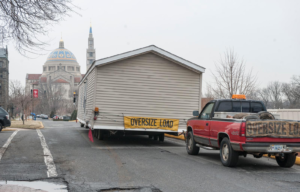‘This is Us’: PEERS Event for Healthy Masculinity Month
By Christopher Vitale
PEERS organized an event entitled “This is Us” on the topic of healthy masculinity this Wednesday. The event formed in recognition of November being touted ‘National Healthy Masculinity Month’ and was manifested as a series of four talks from students representing a diverse range of groups within the Catholic University community. The series ran from 7 to 9 p.m. in Caldwell Auditorium with space for fifty audience members to engage with the students’ speeches.
Dinner was addressed first on Wednesday night which was provided by PEERS and consisted of chicken wings and mac & cheese. Attendees enjoyed food and conversation until 7:30, when a spokesperson for PEERS introduced the first speaker on the issue of masculinity: 5th year student Will Pinhak.
Pinhak, an architecture/civil engineering major and a distinguished service leader on campus, honed in on a facet of masculinity rarely discussed in everyday society—vulnerability. Pinhak noted that society has sculpted its own ideal image of what a man should be, and this image does not provide space for a man to discuss and encounter his emotions. He challenged this construct by suggesting that it is okay to cry as a man, and that crying does nothing to subtract from a man’s sense of masculinity.
Pinhak emphasized the importance of surrounding oneself with role models who will contribute in a positive way to healthy masculinity. He also proposed that the role of a man does not necessarily lie in fulfilling the duty of bread-winner in his family, but rather in acting with courage through every endeavor.
“[Men] have the courage to work and do the best they can. They have the courage to live, and to love, and to be happy, and to laugh. They have the courage to break down and be vulnerable, to express that in front of other people,” said Pinhak.
On this note, Pinhak concluded his speech and was succeeded by Sydney Hartman, a junior marketing major. Hartman launched her talk by informing her audience that masculinity is a concept that students encounter every day here on campus. She argued that in general, it is very difficult for men to talk about their mental health or emotional needs due to the unhealthy expectations of masculinity propagated by the culture.
She also expressed her concern that male students are not given the same opportunities as their female peers to discuss mental health, drawing primarily on the lack of resources offered to men in the sports teams on campus.
“We have the power to destigmatize talking about mental health, especially amongst men,” concluded Hartman.
Next in the line up was Austin Nappi, a sophomore politics and psychology major and member of the Catholic U baseball team. Nappi centered his talk on the toxic notion that men need to be tough. He combatted this idea by advocating that there is no single, correct way to be masculine—that masculinity entails a spectrum of qualities and strengths.
“Toughness is not a measure of masculinity,” assured Nappi.
He continued that men often feel the need to be dominant and to be leaders, and that society has conditioned them to compete for the ‘alpha male’ status. Nappi maintained however that needing to be the ‘alpha male’ is not the best way for a man to be masculine. He also proposed that many men—including himself—struggle with feeling uncomfortable when they’re not in control, but he is confident that his experiences in life have helped him to preserve a positive, healthy perspective.
The final speaker of the night was Maggie Reardon, a sophomore nursing major and an RA in Gibbons Hall.
“I realize that masculinity, specifically the dichotomy of toxic and healthy masculinity, is a concept that not only permeates societal structures and cultural attitudes, but has also influenced my own life,” said Reardon.
She insisted that her parents have been a prime example of a healthy blend between masculine and feminine roles and that they defy the stereotypes by taking on all responsibilities jointly and without limitations.
“My parents’ determination to live authentically seeped into their parenting,” stated Reardon.
She also commented on the injustice of public responses to both the ‘Like a Girl’ campaign and Gillette’s ‘The Best Men Can Be’ campaign. Each sought to combat the restrictive stereotypes placed on men and women in similar ways, yet ‘Like a Girl’ garnered near-universal praise while ‘The Best Men Can Be’ was widely criticized.
Having exhausted all four speeches, PEERS directed the attendees to take a few minutes reflecting on the provided discussion questions stationed at their tables as a means of wrapping up the event. ‘This is Us’ will return next Fall to prompt further conversation on the topic of masculinity.







